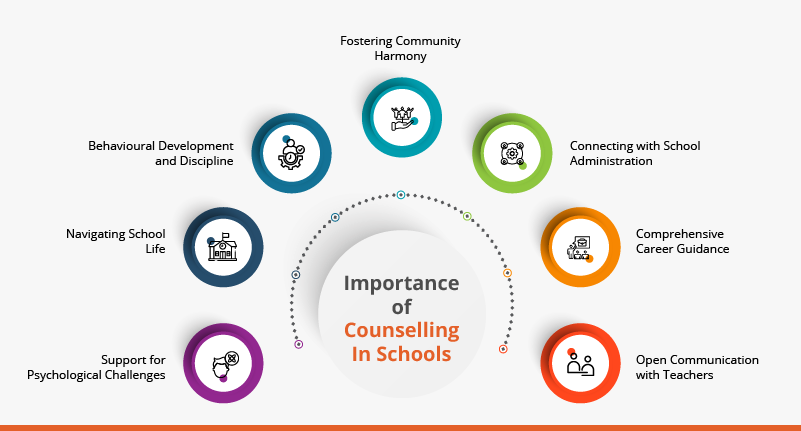Beyond Grades: Exploring the Benefits of Guidance and Counselling in Schools

Each child is unique has a unique mental health situation and an individual imaginative world. Although many of us went through various mental states during our formative years, recognising the same in our children can be a challenge. Some may shy away from addressing the topic, associating counselling with psychotherapy. Nevertheless, there exists a crucial need for counselling in schools, recognising that a child’s early years significantly shape their future.
Counselling is not exclusive to those facing severe mental health issues but is often provided to individuals who are generally well but require additional support in specific situations. In many cases, parents and children struggle with effective communication, making it challenging for kids to cope with life’s fundamental challenges. For example, a school counsellor might need to engage with a child struggling to discuss issues with parents, such as problems with a classmate.
Parents naturally want to understand their kids, but relying only on their own judgments might not give the full picture of normal behaviour. School counselling steps in to focus on children’s emotional, social, and behavioural needs. Its main goal is to make a friendly and smooth environment, helping each child in different parts of their growth.
Importance of Counselling In Schools: A Closer Look at the Advantages

1. Support for Psychological Challenges
Students get helpful guidance on dealing with emotional challenges that might impact their schoolwork. In workshops, they learn practical problem-solving skills to handle issues in their daily life better. This way, they can cope with specific problems and improve their overall well-being.
2. Navigating School Life
Students get guidance on handling different situations they might face in school. For example, they learn how to speak nicely and get along with their friends. This advice helps them understand how to act in specific situations and gives them a good view of the right behaviour.
3. Behavioural Development and Discipline
Guidance plays a big role in shaping how students behave and helping them learn discipline. When students get the right guidance, they can reach their goals. Well-guided and counselled students know the right things to do and how to do them in the best way possible.
4. Fostering Community Harmony
In school, students learn to live together peacefully. This helps them understand and like their classmates better.
5. Connecting with School Administration
It helps students talk to the school office more easily because they can share their issues through proper counselling. This way, there’s a better connection between students and the school administration.
6. Comprehensive Career Guidance
Students receive helpful guidance on careers, courses, and jobs to make informed choices about their future. This advice ensures they understand their options after finishing school.
7. Open Communication with Teachers
Good counselling allows students to have open conversations with teachers about things that bother or make them uneasy. It gives them a space to talk about problems they might not want to discuss with their parents. Students can freely discuss topics like alcohol, drugs, personal feelings, or any form of abuse. These conversations help teachers understand and deal with these issues more effectively. Seeking guidance and counselling also helps students become better individuals as they learn how to act and behave in various situations.
Ready to take teaching to a whole new level? Dive into the future with Extramarks Smart Class Plus – where learning becomes an exciting adventure! Say goodbye to boring classes and hello to interactive tools and awesome content. Let’s revolutionise education together – because every student deserves the best!
Role of Teachers in Guidance and Counselling
Kids need someone to listen to them because they often have a lot of stress. When students talk to a counsellor, it can help them deal with the tough things they’re going through. But it’s crucial for parents to understand how important this is. Good counselling for students can teach them important skills for life, and if they use these skills every day, it can lead to a happy life.
Teachers are a big part of helping and guiding students. They’re usually the first ones students turn to when they need help. Teachers give advice and help, and if necessary, they connect students with other professionals. It’s important for teachers to create a friendly relationship with students, making them comfortable before talking. They should let students know they can talk to someone trustworthy who can quickly solve their problems.
A good teacher needs to care about the student and show interest in their well-being without judging or sharing personal opinions. It’s important for them to understand that it’s not just about how well they do in school; it’s also about shaping their overall personality.
Ready to shake things up? Dive into the future of education with Extramarks! Our smart class solutions are game-changers—making learning fun, interactive, and super engaging. Let’s transform your classrooms into hubs of creativity and discovery. Say goodbye to the ordinary and hello to the extraordinary with Extramarks!
Closing Thoughts
Counselling in schools is really important. It helps take care of students’ feelings and thoughts, making sure they’re okay emotionally. This support also helps them grow personally and sets the stage for doing well in school. Counsellors offer different kinds of help, empowering students to handle problems, become stronger, and learn skills that will help them succeed in school and life. As schools focus on developing students in all aspects, having good counselling programs is a must. It’s a key part of making sure students are doing well and succeeding in everything they do.

Last Updated on February 13, 2025
Reviewed by

Priya Kapoor | AVP - Academics
Priya Kapoor is an accomplished education professional with over 18 years of experience across diverse fields, including eLearning, digital and print publishing, instructional design, and content strategy. As the AVP – Academics at Extramarks, she leads academic teams in creating tailored educational solutions, ensuring alignment with varied curricula across national and international platforms...read more.









